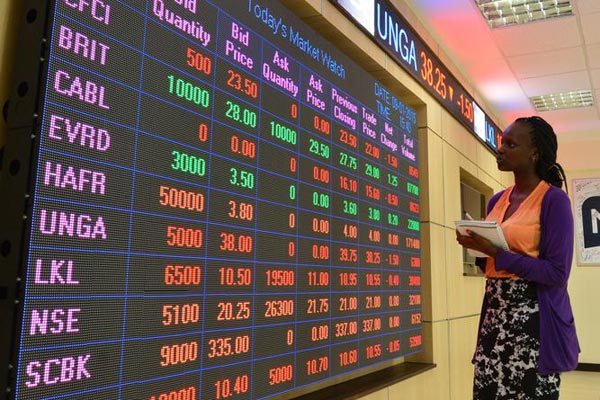Buying and selling shares is one of the easiest ways to make money. 2014 was a good year for stock exchange investors as stocks gained more than 50 per cent in value. In that year, the NSE proved the
How shares work:
- A share is a unit of ownership in a company that is listed on the stock exchange.
- You earn money from shares if the company whose shares you own pays out dividends, or if you sell your shares for a higher price than you bought them.
- The recommended selling price should give you a minimum of 10 per cent profit.
How to do it
- Open CDS account (which is like a bank account, only that it stores shares instead of money) for free at a stockbrokerage firm or investment bank.
- Identify the shares you want to buy using the company forecast (fundamentals). You can ask your stock broker to advise you as you learn to read company reports and start paying attention to business news sections.
- Deposit money with your stockbroker and give authorisation to buy at a certain price. Your buying price should never be higher than the market price the share is trading.
- Your stockbroker should advise on the best, lower price to buy based on the on-going buying bids.
- Shares will be reflected on your CDS account immediately the buy transaction has gone through.
- You have to wait at least three days before you can sell your shares. This is referred to as T+3 (Transaction +3) in stock market jargon.
- You will pay a transaction fee of 2.1 per cent for transactions below Sh100, 000 and 1.85 per cent for transactions over Sh100, 000 when you buy or sell shares.
- You will need to buy a minimum of 100 shares at a time.
Where to find information on company fundamentals
- Financial reports. Look for details such as debt levels, operating profits, sales and management’s summary.
- Management (do you trust that the people leading the company know what they are doing?)
- Income.
- Growth strategies.
- Stock dividend yields.
- The rate at which the stock price moves up or down, also known as volatility.
- Price-earnings ratio (measures a company’s value, cash flow and competitiveness).
Your stockbroker will come in handy in helping you figure out the fundamentals
QUICK TIP
What you need for CDS account:
- A copy of your PIN certificate from KRA
- National ID or passport
- Two recent passport size photos
- Original certificate of incorporation (for companies).
Investment risk is the possibility that your investment may not return the profits you expected, and that you may lose some or all of your capital. Shares have two types of risks:
- Volatility risk: your stock is prone to sudden sharp rises or falls in price.
- Absolute risk: losing money because the company has broken down and your shares are worthless.
- Economic conditions such as rising interest and inflation, and weak economy growth may cause the value of your shares to fluctuate.
- There is also the risk of a company defaulting on a bond it issued (as was the case with TransCentury recently risk of defaulting on Sh. 8.5 billion bond repayment.
Who should invest in shares?
- Investors who can take the loss of money or gross underperformance of shares. These are high-risk investors – they should go for growth and value stocks.
- Investors chasing after stable returns from safe stocks, but who are also willing to allow their investment to grow. These are medium-risk investors – they should go for stocks with value and good dividends.
Returns:
- If you buy the minimum number of shares (100) or invest a small amount and leave it at that, your returns will be very small.
- The value of your shares should increase at a rate higher than inflation.
- If your shares don’t grow because of the current economic environment, and if you are sure that the company fundamentals are good, you should hold on to them until the market recovers instead of selling at a big loss.
- If the fundamentals are weak, you may opt to sell at a loss to cut prolonged losses, and go for better stocks to recover your loss.
Current yields/climate:
We are currently in a bear market. Falling prices present a golden opportunity for you to buy good stocks at a price below their real value.
The stock market is said to be a bear when stocks lose 20 or more per cent of their value collectively, and a bull when stock prices are consistently rising.
Worst time to invest in stocks:
- When many investors are selling their shares at a profit in order to harvest gains they’ve made on their investment (profit-taking).
- When there are more shares for sale than investors want to buy (over-supply).
- When a company is about to issue new shares to its existing shareholders to raise funds (rights issue). The new shares flood the market, lowering the price of the older shares.
- When the price of a stock is going down by more than 10 per cent to adjust its price to its current value following a rights issue or a bonus issue when investors get additional bonus shares (price correction).









